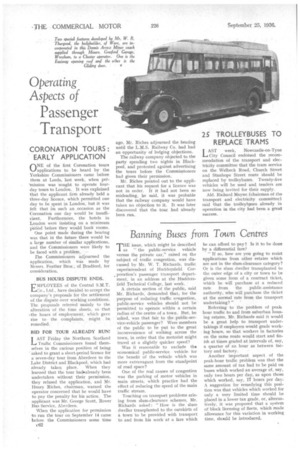Banning Buses from Town Centres T HE issue, which might be
Page 112

If you've noticed an error in this article please click here to report it so we can fix it.
described as " the public-service vehicle versus the private car," raised on the subject of traffic congestion, was discussed by Mr. W. T. Richards, traffic superintendent of Huddersfield Corporation's passenger transport department, in an address at the Huddersfield Technical College, last week.
A certain section of the public, said Mr. Richards, demanded that, for the purpose of reducing traffic congestion, public-service vehicles should not be permitted to operate within a certain radius of the centre of a town. But, he asked, was that fair to the public-service-vehicle passenger? Were members of the public to be put to the great inconvenience of walking across the town, in order that the motorist might travel at a slightly quicker speed?
Was it reasonable to exclude the economical public-service vehicle for the benefit of the vehicle which was more extravagant from the standpoint of road space?
One of the real causes of congestion was the parking of motor vehicles in main streets, which practice had the effect of reducing the speed of the main traffic stream.
Touching on transport problems arising from slum-clearance schemes, Mr. Richards asked : "How is the slum dweller transplanted to the outskirts of a town to be provided with transport to and from his work at a fare which he can afford to pay? Is it to he done by a differential fare?
" If so, how are you going to resist applications from other estates which are not in the slum-clearance category? Or is the slum dweller transplanted to the outer edge of a city or town to be given some form of a contract ticket, which he will purchase at a reduced rate from the public-assistance authority, who will purchase the ticket at the normal rate from the transport undertaking?"
Referring to the problem of peak, hour traffic to and from suburban housing estates, Mr. Richards said it would be a great help to transport undertakings if employers would grade working hours, so that workers in factories on the same route would start and finish at times graded at intervals of, say, a quarter of an hour as between factory and factory.
Another important aspect of the peak-hour traffic problem was that the same amount of tax had to be paid on buses which worked an average of, say, only two hours per day, as upon those which worked, say, 17 hours per day. A suggestion for remedying this position was that vehicles which worked for only a very limited time should be placed in a lower tax grade, or, alternatively, it was proposed that a system of block licensing of fleets, which made allowance for this variation in working time, sheuld be introduced.
























































































































































